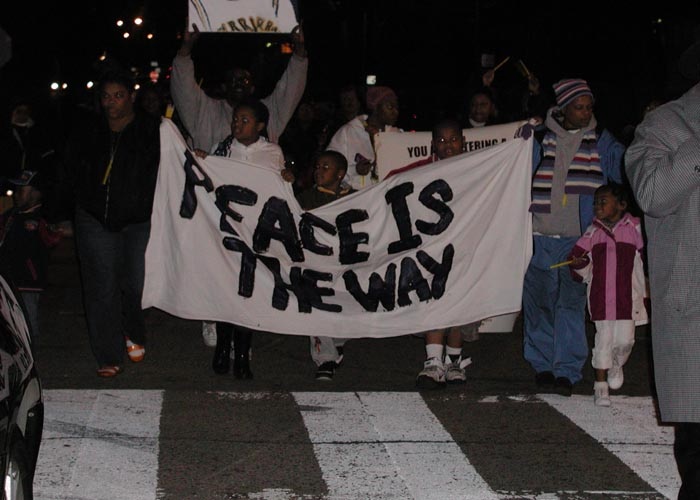|
by Anna Kirsch/POOR Magazine Community Journalist
The streetlights cast a luminescent glow over the marchers'
determined bodies. Large and small feet shuffled over the glistening black pavement. Voices in unison shouted into the brisk December air, "What do we want?" "Peace." "When do we want it?" "Now."
The streets running around John McLaren Park in San
Francisco weren't filled with cars on this chilly Friday evening, but with mothers, families and community members. All demanding an end to violence locally and globally. All saying enough is truly enough.
As I marched among community members, leaders, activists and mothers from all over San Francisco, I felt the power behind these people. I felt the strength of marching with survivors of violence. I felt the pain and anger of loss.
I gazed at the signs, reading Peace is the Way and Peace
Zone, and the pictures of loved ones lost and I remembered my own childhood friend, who was shot to death just one month ago in my hometown. I thought about the mothers in Iraq, who are losing their sons and daughters everyday. I remembered those killed on the streets of San Francisco, Oakland and Richmond only to become forgotten statistics by our government.
One woman also marching in remembrance, pain and strength
was Kraima Baptiste. "I'm here in honor of my brother, Julian Austin, who was killed three years ago," Baptiste said above the echo of the loudspeakers behind her. She spoke confidently. "I'm here to stand as a survivor," she stated.
Like so many, her brother Julian was only 18 years old when
his life was taken. He was shot outside of a Metro PCS store. It was November 1st, Kraima's birthday.
"It was unreal, it felt like someone had sucked the air our
out of my body," she said recalling the day he died as tears gathered in the corners of her soft, dark eyes. "But I know he wouldn't want me to be unhappy, he is my angel," she said.
Baptiste smiled as she remembered the simple things her
brother loved, "a clean white shirt, pizza and a ride were all he needed."
Her pain made me shudder, as I remembered the tightening in
my chest and shaking of my body when my sister's voice came through the telephone with news of Kelly's death. Across the coast and the world, so many others were feeling the same pain.
"It feels good to come together with others like me. There is
power in numbers, instead of being divided we need to build, talk and heal," Baptiste said. Her words, strength and memories gave me hope.
Organized by Community Leadership Academy Emergency Response (C.L.A.E.R.), the march brought together mothers, activists and survivors of violence like Kraima to demand a stop the violence at home and abroad. C.L.A.E.R. is an organization committed to creating a nonviolent community, so residents can reach their maximum potential and flourish. Tonight's march was to help create that safe environment.
The protestors and speakers stood along-side folks from many organizations like the staff at POOR Magazine, many of whom have been personally touched by violence in our low and
no-income communities. We all called for a commitment from the government to address the long-term causes of violence, such as rampant poverty and lack of basic human services and to end the war in Iraq.
"We really need to address the root problem, not just the
surface issues," community leader Reverend Toni Dunbar said. She preached to the crowd as they gathered around the stage and blaring lights on the corner of Sunnydale and Schwerin. She brought forth a message of hope and peace.
"We do have the capacity to change," she said softly and
thoughtfully to me after exiting the stage. "Our children have grown up with murder, poverty and desperation as the norm and this is so far from what we desire for them," she said under the glow of a streetlight. She stressed the importance of the community really coming together to defeat violence.
On this evening Reverend Dunbar's hope for the joining of
communities became true. Supporters of many different organizations, members of many different communities and people of many different backgrounds united under the common cause of the march: to stop violence everywhere.
Renee Saucedo, member of La Raza Centro Legal, said she was
there to represent the Latino community. "We are here in unity to send a message to elected officials that they need to make sure communities have enough here to not resort to violence," Saucedo confidently stated.
"We're not gonna stop until the violence stops and we're not
gonna blame the survivors, but we're gonna blame the powerful. we don't accept as the solution the criminalization of our communities," she added.
As I listened to the scholarship of these community leaders,
survivors, mothers and families and saw the determination in their faces and heard the strength in their voices, I felt the beginning of light. For Kraima's brother, Julian Austin, for my friend Kelly, for the families in Iraq, in Sudan and in Darfar, for those all over the world living in violence, we stood in unity to bring forth light from the darkness.
Anna Kirsch is a Community Journalist and graduate of POOR Magazine's Race, Poverty and Media Justice Institute. To read more work on issues of poverty and racism you can go on-line to www.poormagazine.org To get involved in C.L.A.E.R.'s powerful advocacy and change work you can call them at 415-333-3017
| 



